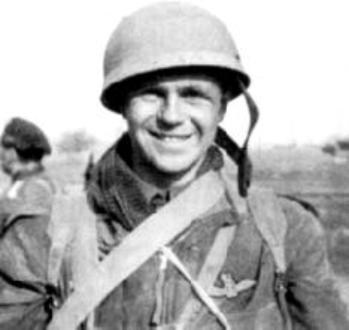Andrews, Harold Norman
- Date of birth:
- January 6th, 1920
- Date of death:
- September 2nd, 2000 (Canada)
- Service number:
- 2078059
- Nationality:
- British
Biography
Norman Andrews was with the Royal Engineers in France but, after evacuation from La Panne, north of Dunkirk, he found service in England unexciting and volunteered for the newly formed Glider Pilot Regiment in 1942.
At the end of World War 2, he was a veteran of airlanding operations in Sicily, Normandy, Arnhem and the Rhine Crossing.
After demobilisation in 1946, Harold Andrews returned to his engineering studies. He emigrated to Canada in 1953 and was commissioned in the Royal Canadian Engineers and kept on flying at Chilliwack in British Columbia.
Do you have more information about this person? Inform us!
- Period:
- Second World War (1939-1945)
- Rank:
- Staff Sergeant
- Unit:
- Army Air Corps
- Awarded on:
- November 11th, 1943
"This pilot showed great courage and coolness in the first glider-borne operation. In spite of very bad weather and great difficulty handling his glider, he managed to arrive in the target area without having to release from his tug aircraft. On arrival, the visibility was extremely poor, which made it extremely difficult to see the coast of Sicily. Nevertheless, this Sergeant Pilot released his glider and by brilliant flying, he managed to land on extremely difficult ground. He had, as one of his passengers, the Deputy Commander of the Airborne Brigade and his Staff who were un-injured. This party was able to move forward and eventually captured a six-gun battery in which Staff Sergeant Andrews took a prominent part."
- Period:
- Second World War (1939-1945)
- Rank:
- Staff-Sergeant
- Unit:
- Army Air Corps
- Awarded on:
- February 15th, 1945
- Awarded for:
- Operation Market Garden
Citation:
"This Staff-Sergeant has taken part in three airborne operations and on each occasion has displayed outstanding skill and courage in bringing his glider down safely and getting his load into action. Subsequent to the landing at Arnhem, Staff-Sergeant Andrews fought throughout the engagement with the greatest gallantry."
Second DFM awarded as a bar for on the ribbon of the first DFM.
"This Staff-Sergeant has taken part in three airborne operations and on each occasion has displayed outstanding skill and courage in bringing his glider down safely and getting his load into action. Subsequent to the landing at Arnhem, Staff-Sergeant Andrews fought throughout the engagement with the greatest gallantry."
Second DFM awarded as a bar for on the ribbon of the first DFM.
Sources
- Photo 1:
- Photo: The Pegasus Archive
- - Supplement to The London Gazette Issue 36243 published on the 9 November 1943
- Supplement to The London Gazette Issue 36939 published on the 13 February 1945
- The Pegasus Archive
- RAF Commands - Forum
- WW2Talk



